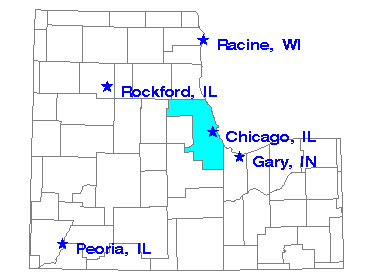
|
|
Awardee
Chicago Asthma Consortium
Chicago, Illinois
Target Population
In keeping with the Healthy People 2010 goals of eliminating racial/ethnic health disparities, three high-risk communities have been selected as target populations for the initial phase of this project. The percentage of African Americans within each of these communities is high. African Americans have been shown to be four times more likely to die from asthma than their white counterparts and, based on a recent local study, these inner city communities have shown an increase in asthma hospitalizations. The project plan calls for a fourth community, primarily Hispanic/Latino, to be added in year two with the possibility of a fifth community being added in year three. Additional selection criteria for the communities includes a partnership community organization with five or more years experience in community mobilization willing to sign a letter of commitment agreeing to support all phases of the project.
Proposed Strategy
Employing the Community Organization Theory, the program utilizes the "community activation" approach, which emphasizes the involvement and coordination of major community institutions to mobilize community leadership and resources for health promotion and to improve public awareness of health issues. It also employs the Social Marketing Theory, which will guide the design and distribution of the asthma awareness message. Specifically, communities will participate in general public asthma awareness events, conduct a community assessment, and identify community asthma leaders to promote the development of local asthma networks, integrate the coalition as part of the community, and facilitate communications between other segments of the community.
The proposed strategy will focus on two NAEPP goals:
- #1 -- To promote asthma awareness; and
- #2 -- To implement community asthma programs and policies.
Anticipated Outcome
Formative evaluation will be used to guide program efforts. However, ultimately, the project hopes to build community capacity for policy changes and asthma awareness. Specifically, the project intends to increase the percentage of schools, churches, childcare centers, and other local organizations that implement asthma-friendly programs and policies and identify members of the target community to act as community asthma leaders.

